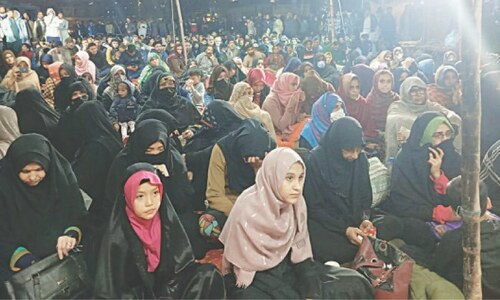KARACHI, Oct 26: A police informer, who tipped off the special investigation unit of the police about the presence of militants belonging to the Al Qaeda-linked group Jundullah in the sleepy locality of Shah Latif Town, which led to a three-hour long gun battle on January 29, was beheaded along with his six family members in the Swat Valley.
Well-placed sources said that the police informer was abducted from Karachi a few months ago. He was taken to his native town, Swat, where he, along with his six family members including his wife, children, and parents, were beheaded apparently by the Taliban.
They said the incident occurred recently when militants in the restive valley were widely resorting to beheadings of the elements who they dubbed as informers working for the government and damaging their cause.
It was only several weeks after the killings that Karachi police learnt about the fate of their valuable informer, the sources said.
The informer’s abduction from Karachi in a discreet manner and his subsequent beheading along with his family bore the hallmarks of the Al Qaeda-linked Jundullah, with the militant outfit active in the NWFP as well as Karachi, sources said.
Informants enjoy a pivotal role in policing and the police reward them well, though keeping their identities secret. However, it is often seen that not enough attention is paid to the security of the police informers.
Keeping mum
Since the recent killing in Swat could have exposed the failure of the police to protect their informers, they kept mum over the incident, the sources observed.
Acting on the tip-off provided by the informer, the police had raided a house in Shah Latif Town in January. Four militants were killed and two police officers lost their lives while another officer suffered injuries in the encounter that lasted for three hours.
During the shoot-out, head constable Raja Tariq suffered a fatal bullet wound and died before he could be brought to hospital. Inspector Asghar Dhari met the same fate. Four suspects managed to escape. However, they were challenged by former SP Landhi Azad Khan and his escort at Landhi 89. During the shoot-out, three militants were killed and another was critically injured, who later succumbed to his wounds, while the SP suffered bullet wounds.
The encounter demonstrated that the militants had a high degree of training as they almost outsmarted the police had they not been intercepted in Landhi.
The sources said Jundullah largely comprised some youths belonging to Karachi, though the beheading established the fact that they were in league with the militants pitched against the government in the restive lands of the Federally Administered Tribal Areas (Fata).
Initially formed by some young men residing in the areas of Shah Faisal Colony, Model Colony and Landhi, Jundullah was lately reorganised to carry out a fresh wave of terror in the metropolis, the police had claimed following the Shah Latif encounter.
The same outfit was said to be responsible for the attack on a former corps commander’s motorcade on June 10, 2004, that resulted in 11 deaths. The group had also attacked the Gulistan-i-Jauhar police station the same year, in which six policemen were killed.
Police said Jundullah members Abdullah, Ibrahim and Ibrar Pathan were killed in the encounter while Tayyab Dad succumbed to his wounds on February 3 at the JPMC. Qasim Toori, who was wanted in the corps commander case, was arrested in the encounter, they claimed, adding that the identities had been confirmed by their captured associate.
However, another member of Jundullah, Syed Kashif Ali Shah alias Shaheen, was still absconding, the sources said.
Kashif was a compounder by profession, they said, adding that he extensively travelled between Karachi and Waziristan, which confirmed his role as an intermediary in the network of terrorists.
Other absconding members of the outfit were Hammad, Bilal and Shahab, sources said, though they made it clear that the names might not be real as these were suspected to be code names.














































Dear visitor, the comments section is undergoing an overhaul and will return soon.